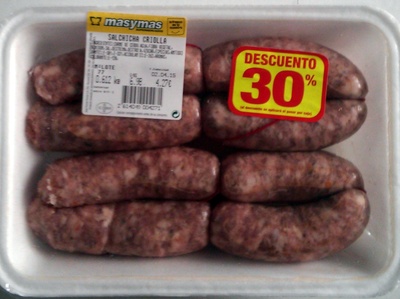Salchicha criolla - masymas - 612 g
Aquesta pàgina del producte no està completa. Podeu ajudar a completar-la editant-la i afegint-hi més dades a partir de les fotos ja disponibles, o fent-ne més amb l'aplicació de androide o iPhone / iPad. Gràcies!
×
Codi de barres: 2614049004271 (EAN / EAN-13)
Nom comú: Salchichas
Quantitat: 612 g
Empaquetament: Plàstic, es:Envasado en armosfera protectora
Marques: Masymas
Categories: Productes amb base de carn, Carns, Carns preparades, Embotits
Etiquetes, certificacions, premis: es:Descuento 30 %
Llocs de fabricació o processament: Alicante (provincia), Comunidad Valenciana, España
Codi de traçabilitat: ES 10.12888/A CE
Botigues: Masymas
Països on es va vendre: Espanya
Matching with your preferences
Salut
Ingredients
Processament d'aliments
Additius
Anàlisi dels ingredients
L'anàlisi es basa únicament en els ingredients enumerats i no té en compte els mètodes de processament.




